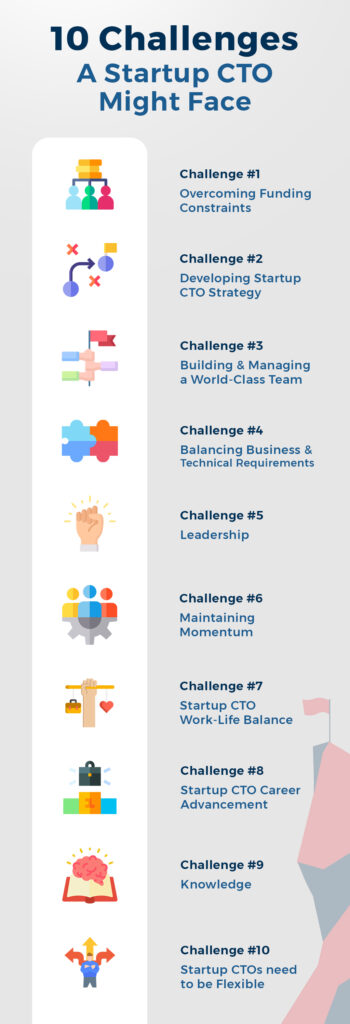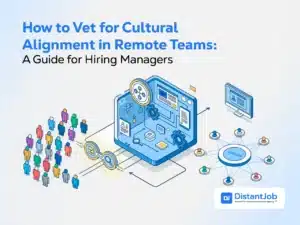As a Startup CTO, your top responsibility is overseeing your company’s technology strategy. You also need to make sure that the whole tech team has what they need to be successful. And work closely with them on coding projects.
We outlined 10 of the most common startup CTO Challenges and share some skills every CTO needs to succeed! Plus, the responsibilities you must embrace as one.
Startup CTO Job Description and Role
A Startup’s CTO lays the foundation for their technology team to build and scale. As a startup’s technical leader, your goal should be to set up processes that work well with the brand’s culture while making sure you are building quality products.
Your job includes finding talent, managing people, leading product development initiatives, ensuring alignment between technical and business goals, and more.
10 Challenges A Startup CTO Might Face?
The following are 10 of the most common Startup CTO challenges:

Challenge #1 – Overcoming Funding Constraints
To have the necessary resources to build a world-class technology team, you often need to raise more money than early-stage startups typically have. This can be a challenge for startup CTOs who need to make the most of every dollar.
Solution
Be scrappy and creative when it comes to getting resources for your team. For example, you can look for affordable talent with the help of recruitment experts like DistantJob that can assist you to hire full-time employees for half the cost.
Challenge #2 – Developing Startup CTO Strategy
Developing startup strategies can be a challenge for startup CTOs. It is not always clear how to manage a tech team while technology aligns with overall business strategy.
Solution
The best way to develop your startup CTO strategy is by talking through the issues and challenges you are facing in detail with other people who have worked on similar issues in the past in your network. Or your company’s business managers for better clarity. Remember: communication is everything when developing a strategy.
Challenge #3 – Building and Managing a World-Class Team
Building and managing a world-class technology team is one of the most difficult challenges for Startup CTOs. Startup CTOs need to build a world-class technology team that can solve complex problems, develop new products, and meet tight deadlines while being tight-fisted with the resources they have available.
Solution
The best way to build your tech team is by hiring programmers you know are talented, and who share similar values as you do, so they work well together. You should also put in place a system for evaluating and tracking employee performance so you can identify areas where they need improvement and help them grow.
Challenge #4 – Balancing Business and Technical Requirements
CTOs often need to balance the business and technical requirements of their company. This can be difficult since the two segments rarely work hand in hand.
Solution
Startup CTOs can help reduce tensions between business and technical requirements by communicating the benefits of each requirement to both sides, so they are more likely to work together cohesively.
You should also make sure you have a dedicated team member responsible for one area (e.g., sales or product development) so they can focus on a specific area and help improve communication.
Challenge #5 – Leadership
As a startup CTO, you’ll need to take the lead in developing technical strategy, ensuring the team is motivated, creating plans for future development, and communicating with stakeholders like investors about the progress made towards goals.
Solution
The best way to become a good Startup CTO leader is by practicing and learning from your mistakes. You can also read books or articles on leadership, attend leadership training courses or talk to other leaders in your industry to get their advice.
Challenge #6 – Maintaining Momentum
Once a Startup gains some traction and starts making progress, the pressure is to maintain that momentum. Startup CTOs need to continue innovating and developing new products while ensuring their current product offering remains strong.
Solution
CTOs can maintain momentum by setting short-term and long-term goals, communicating these goals regularly to stakeholders, and making sure their team is aware of these goals. They should also regularly track projects to ensure the team meets their targets and use this insight to make plans for the future.
Challenge #7 – Startup CTO Work-Life Balance
Startup CTOs often have very little work-life balance. This can be a challenge because many CTOs are passionate about their work and want to devote all of their time to it.
Solution
You can improve your work-life balance by setting boundaries for yourself, such as not working on the weekends or after a certain time in the evening.
You should also make sure you have a good support system in place, such as a spouse or family member who can encourage you to take time away from work.
Startup CTOs should also look out for warning signs that they are sacrificing their health and well-being for the job. So they can give themselves a much-needed break when necessary.
Challenge #8 – Startup CTO Career Advancement
CTOs may face challenges in advancing their career because many startup CTO roles are filled by technical founders.
Solution
The best way for startup CTOs to advance their careers is by learning new skills and taking on leadership roles within their organizations. You can also start a side project to demonstrate your expertise so you can gain the recognition and respect of others in your industry.
You should also try to maintain connections with key stakeholders, such as investors or other startup employees. They might be able to help support your career advancement efforts down the track.
Challenge #9 – Knowledge
Startup CTOs need to have a wide range of knowledge, from technology and development to business strategy and product management. This can be difficult to learn and keep up with.
Solution
As a startup CTO, you can improve your knowledge by reading books, articles, and blog posts on various topics. As well as attending training courses or seminars and talking to other experts in their field. You should also make sure you are up-to-date on the latest technology trends and developments so you can ensure your startup is using the best possible technologies.
Challenge #10 – Startup CTOs need to be Flexible
CTOs often need to wear many hats, from developing products and leading the technical team to managing budgets, marketing, and hiring. So as a startup CTO, you’ll need a wide range of skills for each role so you can fill in when necessary.
Solution
Startup CTOs should be able to handle all these tasks because most startup leaders have an entrepreneurial mindset that allows them to quickly adapt their roles according to the changing needs of the Startup. They should also look for opportunities to improve their skills and knowledge to take on more responsibilities in the future if necessary.
Skills a Startup CTO Needs
A startup CTO is responsible for many things, but the most important skills a startup CTO needs are:
- Be Versatile: As a startup CTO, your role is like that of any other officer in a startup–you need to be able to do a little bit of everything. This means you need to have engineering skills, product management, marketing, and business development.
- Be a Leader: You need to be able to inspire your team and lead them through difficult challenges.
- Be able to make Quick Decisions: As a startup CTO, you’ll often need to make decisions quickly and under pressure.
- Have a Strong Technical Background: As the head of engineering for your startup, it’s essential that you have a deep understanding of technology and how it can be applied to solve problems.
- Understand the Business: It’s also important that you have a good understanding of business, especially of the startup world.
- Be able to Think Strategically: You need to be able to develop a long-term vision for your company and have the knowledge to execute it.
- Think Big Picture: As CTO, you’ll often need to take a step back from day-to-day operations and focus on what your company will look like in five years. In other words, plan for the long term.
- Be Collaborative: You should also be able to collaborate with other people on your team, including the CEO and Product Manager
- Have a “no ego” Attitude: Startup CTOs are expected to do whatever it takes for their companies to succeed-even if that means giving up some of their glory.
- Project Management Experience: As CTO, you’ll often be responsible for managing and executing large technical projects. So you need some sort of project management know-how and tools to successfully execute them.
- Coding Skills: Being able to code is becoming an increasingly important skill for CTOs. Even if you don’t write code yourself, you should at least be familiar with different coding languages and how they can be applied to solve problems.
- Hiring Skills: A startup CTO should also have strong hiring skills and be able to find the right people for their team.
- Be a Good Communicator: You need to communicate effectively with your team, investors, and other stakeholders in your company.
- Have an Open Mind: Startup CTOs are often expected to work with technologies that they’re not familiar with or aren’t even popular yet.
- Be Flexible: Startup CTOs also need to be able to adapt quickly and pivot their strategies when necessary.
- Have a Good Reputation: As the head of technology, your company’s success will often depend on winning customers’ trust and having them stick with you for the long haul.
- Maintain a Growth Mindset: As CTO of a startup, you’ll often have to work hard towards goals that don’t even exist yet. You need to have a growth mindset and be willing to pivot when necessary.
The Top CTO Responsibilities
Now that you know what skills a startup CTO needs, let’s take a look at some of the top responsibilities of a CTO:
Tech Stack Suggestions
Whether you want to become a CTO or are in the process of hiring a Startup CTO, you need to keep in mind that they’ll be in charge of suggesting what kind of technology platform to use for the project.
Projects need to consider things like how many developers you have, how much they cost, and how long it will take for them to deploy the project. You also need to think about security, community support, and if it is a good fit for your business.
Getting an MVP Up and Running
As a CTO, you’ll need to build an MVP. The goal of the MVP is to create a product that can test user feedback as soon as possible. Sometimes, the founder of the company does this, but if they are not good at programming, they need to find someone else to do it for them.
This person (CTO) will be responsible for making any changes to a product. They are also in charge of the quality of the final product.
DevOps
Startups can do without a DevOps specialist. A CTO will be in charge of this until they hire a person who does it consistently. The CTO is in charge of domains and SSL certificates, setting up servers, databases, third-party tools, and ensuring that their company is safe technology-wise.
Attracting and Coaching Developers
The CTO is the boss of all tech staff. They hire and train them. This means they need to have a strong network to find talent for their company. CTOs also need to be able to successfully interview and understand engineering well too.
Quality Assurance
A team of people who carry out quality assurance is rarely found in startups. And it’s even rarer for this to happen at the early stages.
Usually, testing is done by members of the team. And the CTO usually has to come up with a system for testing. Besides that, the CTO is typically the only one who knows how the architecture works well enough to test adequately.
Improving Architecture
The CTO is in charge of the app’s architecture in the early phases. After developing a product’s first versions, there may come a time when an architectural upgrade is urgently required. Having an agile tech team is essential. So the CTO should address the process himself or delegate it to a more experienced engineer.
Other general responsibilities include:
- Developing and executing the technology strategy for the company
- Leading and managing the engineering team
- Managing budgets and resources
- Partnering with other teams to deliver the highest quality product
- Keeping up to date on the latest technologies and industry trends, especially in engineering
- Working with sales, marketing, customer service executives, etc. ensuring everyone is aligned towards achieving company goals through technology
- Representing your company at conferences or other events where you can share knowledge about software development with others
- Collaborating with the CEO and Product Manager to define product requirements
- Creating a long-term vision for your company’s technology strategy. This includes deciding which bleeding edge technologies you might want to invest in overtime
- Defining processes and procedures so they can be carried out more effectively by others
- Helping create hiring plans and interviewing potential candidates
- Maintaining relationships with investors and key partners
- Being the public face of your engineering team, representing them in a positive light to others
- Providing leadership and mentorship to engineers on your team so they can reach their full potential
- Ensuring that all projects are executed effectively and on time
That’s it!
Find the Right CTO for your Project!
If you’re interested in finding a top CTO for your project, then we can help you out!
DistantJob’s elite team of tech recruiters discover and hand-pick the best CTOs relevant to your project and business goals. If on the other hand, you’re a CTO looking for a job opportunity visit DistantJob here.





